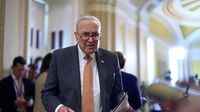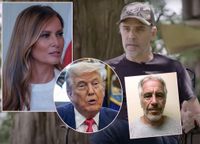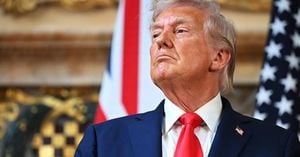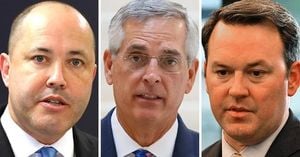In a swirl of legal threats, viral interviews, and disputed accounts, a high-profile feud has erupted between former First Lady Melania Trump and Hunter Biden, the son of President Joe Biden. At the heart of the controversy lies a claim that Jeffrey Epstein, the notorious financier and convicted sex offender, introduced Melania to Donald Trump. The allegation, originally made by author Michael Wolff, has set off a chain reaction of denials, legal maneuvers, and public sparring—drawing in major media outlets, biographers, and the former president himself.
On August 6, 2025, Melania Trump’s legal team sent a sharply worded letter to Hunter Biden, accusing him of making “false, defamatory, disparaging, and inflammatory statements” about her, as first reported by Fox News. The letter demanded that Biden immediately retract his comments and issue an apology, or else face legal action. The trigger: Biden’s remarks in a viral YouTube interview with filmmaker Andrew Callaghan, aired on Channel 5 in the UK, where Biden repeated Wolff’s claim that Epstein introduced Melania to Donald Trump. "Epstein introduced Melania to Trump — the connections are so wide and deep," Biden said, echoing Wolff’s assertion.
The claim, however, has been hotly disputed by the Trumps and their allies. According to Melania’s 2024 memoir, Melania, she first met Donald Trump at the Kit Kat Klub in Manhattan in 1998—a version also supported by Donald Trump, who has insisted that Epstein “had nothing to do with Melania,” as he told Brian Kilmeade during a radio interview. Trump further revealed that he encouraged Melania to pursue legal action, stating, “I let her use my lawyers,” and boasted about his own track record with lawsuits, framing the move as part of a broader legal strategy.
Melania’s legal letter, penned by attorney Alejandro Brito, called the Epstein introduction story “false, defamatory, disparaging and inflammatory,” and threatened a $1 billion lawsuit for reputational damage if Biden did not comply with the demand for a retraction and apology. The letter referenced the origins of the claim in a Daily Beast article, which was itself based on Michael Wolff’s comments during a podcast. After Melania’s legal team intervened, The Daily Beast retracted the article and issued a public apology, a move mirrored by political commentator James Carville, who had also repeated the claim.
Despite the legal pressure, Hunter Biden refused to back down. After the deadline to comply—5 p.m. on August 7—passed, Biden responded in a second video, again with Callaghan, posted on August 14. His blunt retort: “F**k that. That’s not gonna happen.” He went on to call the Trumps “bullies,” and dismissed the lawsuit threat as a distraction, saying, “I don’t think that these threats of a lawsuit add up to anything other than a distraction because it’s not about who introduced whom to whom. I don’t know how that, in any way, rises to the level of defamation to begin with.”
Biden even offered a provocative counter, inviting the Trumps to participate in depositions to clarify their connections to Epstein and his associates. “If the president and the first lady want to do that, and all of the known associates around them at the time that they met, I’m more than happy to provide them the platform to be able to do it,” he said, suggesting he would welcome public scrutiny of the relationships in question.
The origins of the disputed claim are tangled in a web of modeling agencies, party introductions, and overlapping social circles. According to biographer Mary Jordan’s 2020 account, Melania met Donald Trump through Paolo Zampolli, a modeling agency owner and friend of Trump, at a party in 1995. Zampolli and Melania reportedly hit it off during her modeling days in Europe, and he encouraged her to move to the United States. At a party in New York, Zampolli introduced Melania to Trump, who was then accompanied by another woman. Both Zampolli and Trump have maintained for years that Zampolli made the introduction, and Melania’s own statements align with this version.
Yet, as reported by NewsNation and Vogue, Zampolli and Epstein themselves were acquaintances, with records suggesting they even tried to buy the Elite Modeling Agency together. This overlap in social and business circles has fueled public skepticism and speculation, especially given the history of modeling agencies serving as gateways for young women into the orbit of wealthy and powerful men like Trump and Epstein. Still, no direct evidence has emerged to support the claim that Epstein was responsible for introducing Melania to Trump, and Melania’s team has been assertive in insisting that her memoir offers the only accurate account.
The legal battle has also highlighted the challenges of navigating defamation law in the digital age. Brito’s letter to Biden emphasized the “overwhelming financial and reputational harm” caused by the widespread dissemination of the claim, which he said had reached “tens of millions of people worldwide” through various digital platforms. The letter accused Biden of “maliciously electing to republish” false statements, despite knowing that the original source had been retracted and disavowed.
Biden, for his part, argued that his comments did not meet the legal threshold for defamation and suggested the lawsuit was intended to intimidate rather than seek justice. “They think that a billion dollars is going to scare me,” he said, doubling down on his refusal to apologize or retract his statements.
The controversy has generated significant media attention, with some commentators suggesting that Melania’s legal threats have only amplified the story—a classic example of the so-called “Streisand Effect,” where attempts to suppress information inadvertently lead to greater public awareness. As the dispute continues to play out in the court of public opinion, the lines between fact, rumor, and reputation remain sharply contested.
With both sides refusing to budge and the media spotlight only intensifying, the clash between Melania Trump and Hunter Biden has become a telling episode in the intersection of celebrity, politics, and the law—a reminder of how quickly a single claim can spiral into a national spectacle.





